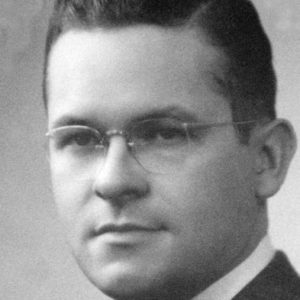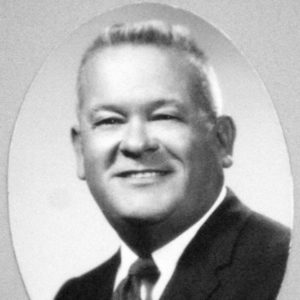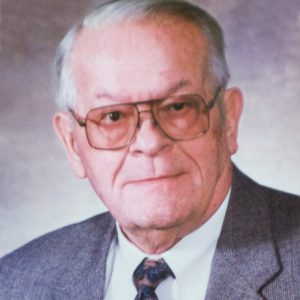calsfoundation@cals.org
Max Howell (1915–1999)
William Max Howell was a politician who served in the Arkansas legislature longer than anyone in history, accumulating power that rivaled that of the nine governors with whom he served. In forty-six years in the legislature, forty-two of which were in the Senate, Howell sponsored more than 700 bills, altering the course of higher education and the judicial system and sharply expanding the state’s services for the disabled and mentally ill.
Max Howell was born in Lonoke (Lonoke County) on December 22, 1915, the third of five children. His father, Flavius Josephus Howell, operated a rural telephone company but later operated a rice farm. When Howell was about five, the family moved to Little Rock (Pulaski County), where his father sold insurance and his mother, Marguerite, sewed for the Gus Blass Company and Pfeifer department stores. Howell graduated from Little Rock High School (later Central High School), skipped college, and read law under L. J. Dowd, a retired and blind law professor who lived next door. He passed the bar examination but worked at odd jobs until joining the army in early 1942. He became a procurement officer for the Army Air Corps. After World War II, Howell joined a small law firm, and, after several years, he and Dale Price left and started their own law firm.
Howell married Lula Agnes Gray when he finished high school, and they had a son and a daughter. They later divorced, and, in 1967, he married Inez Donham of Little Rock, who had four children from a previous marriage.
Howell returned home near the end of the war and immediately entered politics, determined to help change the state’s reputation. He was elected to the state House of Representatives from Little Rock in 1946, served two terms, and was elected to the Senate in 1950. He swiftly mastered parliamentary rules and legislative technique. In 1955, he introduced a bill to establish a state program for severely handicapped children. The Arkansas Children’s Colony at Conway (Faulkner County) was the first of six regional centers for the disabled.
In the same session, Howell kept Arkansas from joining the parade of Southern states that enacted complex pupil-assignment laws to thwart the integration of public schools. Such a bill was introduced in the Arkansas House of Representatives with backing from eastern Arkansas legislators and passed quickly. When the bill came to the Senate late in the session, Howell alone took the floor to oppose it, saying, “We are supposed to have equal rights in a democracy. Just because Alabama or some other dyed-in-the-wool Southern state jumped in haste to preserve something doesn’t mean Arkansas should. Let’s don’t be impetuous.” With the quiet support of several other senators, Howell kept the bill tied up with one parliamentary maneuver after another until the legislature adjourned. Arkansas was hailed as the only Southern state that stood against the tide. However, Arkansas voters approved an assignment law in the 1956 general election, and, in the spring of 1957, Howell was unable to stop another batch of segregation bills from becoming law, setting the course for the integration crisis at Central High School that fall.
By 1965, Howell had become the single most powerful member of the legislature. He chaired the Judiciary Committee, and, for his last thirty-five years, he chaired or was a powerful force on the Joint Budget Committee, through which every spending bill passed. Howell also sponsored or handled bills that turned the private Little Rock University into the University of Arkansas at Little Rock (UALR) and turned the night law school at Little Rock into a full-time, state-funded law school under the supervision of UALR (now the UALR William H. Bowen School of Law). Governor David Pryor signed these bills despite opposition from the University of Arkansas (UA) in Fayetteville (Washington County).
Pryor later remarked that his worst day as governor was the day he vetoed two of Howell’s bills and had to endure the senator’s wrath. Bill Clinton, who tangled with Howell early in his twelve years as governor, once called him “humble and self-effacing,” adding: “He just wants to be treated like every other Roman emperor.”
Howell gave up his seat in Little Rock and moved to Jacksonville (Pulaski County) after the decennial reapportionment of the legislature in 1971 abolished multi-member legislative districts and placed him in a district with a fellow senator. When he led the drive to ratify the Equal Rights Amendment in the Senate in 1973, opponents in Jacksonville started a petition campaign to recall him, though it failed. Howell ran unopposed until he retired in 1992 after the adoption of a constitutional amendment limiting the terms of legislators.
Howell died on October 15, 1999, and is buried at Roselawn Memorial Park in Little Rock.
For additional information:
Blair, Diane D. Arkansas Politics and Government: Do the People Rule? Lincoln: University of Nebraska Press, 1988.
Freyer, Tony A. “Politics and the Law in the Little Rock Crisis, 1954–1957.” Arkansas Historical Quarterly 66 (Summer 2007): 145–166.
“Max Howell.” Character Collection, University of Arkansas at Little Rock Center for Arkansas History and Culture. https://ualrexhibits.org/characters/early-life-max-howell-1/ (accessed May 18, 2023).
Max Howell Papers. Center for Arkansas History and Culture. University of Arkansas at Little Rock, Little Rock, Arkansas.
Silverman, Julia. “Max Howell Dies; Had Clout in Legislature.” Arkansas Democrat-Gazette. October 16, 1999, pp. 1, 14A.
Ernest Dumas
Little Rock, Arkansas
 Democratic Party
Democratic Party Max Howell
Max Howell  Max Howell
Max Howell  Max Howell
Max Howell 




Comments
No comments on this entry yet.